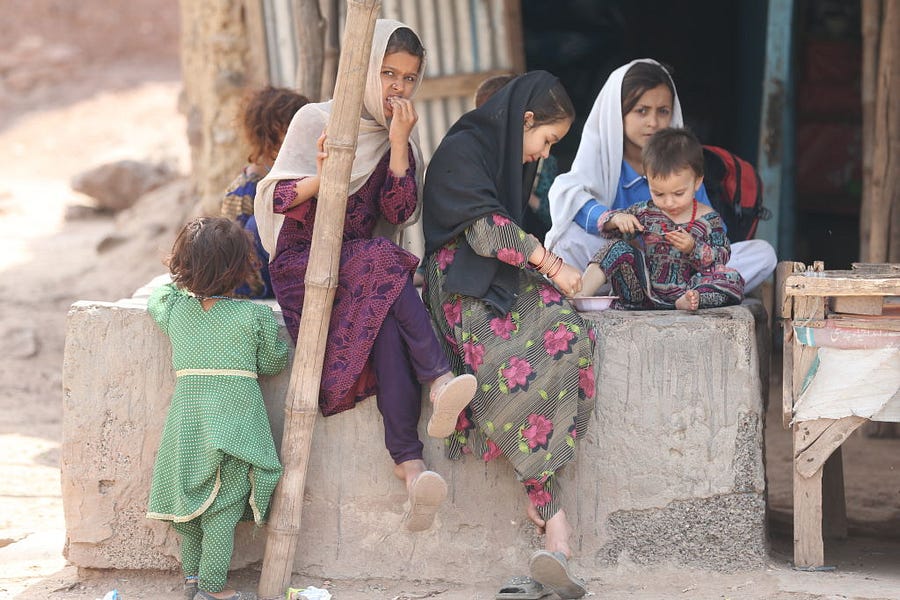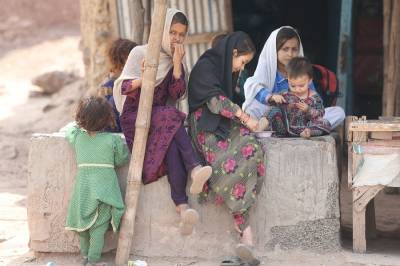Tucked away in a bustling neighborhood on the outskirts of Islamabad, a displaced family of seven lives together in a windowless room. The father and mother, teenage son, and four daughters have resided in Pakistan since June, after Taliban fighters ousted them from their ancestral homeland in neighboring Afghanistan. Now, they share four white walls and a broken fan.
“I think it’s impossible for a big family like ours to live here without any sponsor,” the eldest daughter told The Dispatch. “We just eat twice a day. We don’t have any lunch.”
By any definition, the family qualifies as an at-risk group in the Taliban’s Afghanistan: the father for his literacy and former employment by a foreign organization, the parents and children for their Hazara heritage. As Afghanistan’s second-largest ethnic minority and Shiite Muslims, Hazaras have historically faced targeted displacement and killings at the hands of the Taliban and other Islamic extremists who deem them apostates, including the Islamic State.
On one occasion, the daughter said, her father was held and tortured by Taliban captors for several days. On another, he and his young son were beaten by the Taliban after trying to prevent the forced eviction of a local Hazara community.
Despite such vulnerability, the family and others like them have yet to receive humanitarian aid designated by the United Nations and global donors for asylum seekers. Many Afghan refugees now face the choice between destitution in Pakistan or danger in Afghanistan, where the Taliban continues to target former government officials and foreign-affiliated Afghans for torture and extrajudicial killings. And limited employment opportunities, a high cost of living, limited access to medical care, and price gouging threaten the survival of Afghan newcomers in Pakistan.
To be sure, Pakistan’s public sector faces a daunting task in reaching each Afghan refugee in need. The country currently hosts an estimated 1.3 million registered Afghan refugees and upwards of 3.5 million in total—many of whom were among the desperate civilians who poured across the 1,640-mile border to escape Taliban advances last year. As of December, more than 300,000 Afghan refugees had entered Pakistan since the fall of Kabul. But despite financial support from the United Nations High Commissioner for Refugees (UNHCR), the U.S., and other international backers, local authorities have not been able to provide basic necessities or offer long-term visas to many of the newest asylum seekers.
While the Pakistani government’s failure to adequately accommodate the latest influx of refugees is attributed in part to economic instability and resource shortages, experts also point to various political pressures to explain the cold welcome. As the major political and financial sponsor of the Afghan Taliban prior to Afghanistan’s fall, the Pakistani government has sought to discourage the permanent settlement of refugees fleeing the extremist group’s Islamic Emirate.
“The Pakistani position is that there’s nothing wrong with Afghanistan after the Taliban have taken over,” a former Pakistani government official told The Dispatch. “So while Pakistan may want to allow these people to transit because of U.S. pressure, Pakistan has an interest in pretending that everything is normal in Afghanistan.”
Some Afghans fear the Pakistani government’s business-as-usual attitude could mean eventual repatriations, and its recent public messaging has done little to assuage their concerns.
“Pakistan has shouldered the responsibility of one of the largest and most protracted refugee situations in the world for over four decades. Pakistan continues to host more than three million Afghans,” Pakistan’s foreign ministry said in a statement on World Refugee Day last month. “There is a need for renewed international commitment, especially in the context of COVID-compounded socio-economic and health challenges, through regular, predictable and adequate financing for Afghan refugees including their safe and dignified return.”
The Afghan Taliban’s mediating role in peace negotiations between the Pakistani government and the Tehreek-e-Taliban Pakistan—a Taliban-allied insurgent group responsible for a series of attacks on the Pakistani security forces—further incentivizes Pakistan to maintain friendly relations with its neighbor. In an effort to toe the line between playing nice with the Taliban and upholding international obligations to refugees, Pakistani government officials have sought to offer a way station for refugees, not a final destination.
Following pressure from the U.S. government, Pakistani Prime Minister Shehbaz Sharif announced that the government had approved a program to grant Afghan nationals short-term transit visas while their visas are processed in third countries, adding that the “international community should also lend a helping hand to [the] people of [Afghanistan].” But given major backlogs in U.S. and international asylum programs amid dual crises in Afghanistan and Ukraine, experts consider the visas’ 30-day duration far too short.
After the visas expire, Afghan citizens lose their refugee accreditation in Pakistan, making it difficult to find employment and housing. The undocumented refugees who do manage to secure either are often targets for exploitation by employers and tenants leveraging their legal status. Many public goods and services are also available only to Pakistani nationals. The government issues computerized national identity cards to Pakistani citizens 18 and older, effectively barring Afghans without proper credentials from doing things like opening a bank account, accessing public healthcare, and buying a cell phone.
“Pakistan wants Afghans to remain in Afghanistan. It doesn’t want them to become refugees in Pakistan,” the former Pakistani official explained. “They may not be picking them up and throwing them across the border, but what they are doing is creating circumstances for these people to just give up and go back.”
For the Hazara family sheltering outside of Islamabad, returning home would mean a life underground.
“Pakistan will someday have to recognize that the Taliban are not a force for good, and that people escaping it are bona fide refugees under international law,” Husain Haqqani, former Pakistani ambassador to the U.S. and current director for South & Central Asia at the Hudson Institute, told The Dispatch. “But so far, Pakistan is walking a tightrope of maintaining close relations with the Taliban while at the same time asserting that it’s fulfilling its international obligations.”







Please note that we at The Dispatch hold ourselves, our work, and our commenters to a higher standard than other places on the internet. We welcome comments that foster genuine debate or discussion—including comments critical of us or our work—but responses that include ad hominem attacks on fellow Dispatch members or are intended to stoke fear and anger may be moderated.
With your membership, you only have the ability to comment on The Morning Dispatch articles. Consider upgrading to join the conversation everywhere.